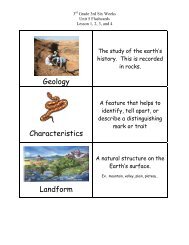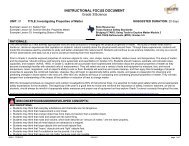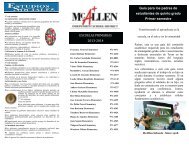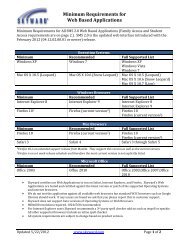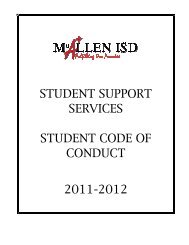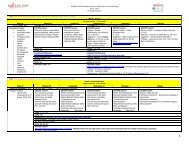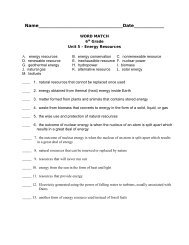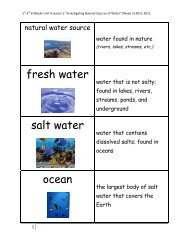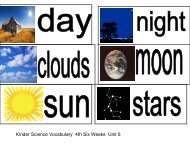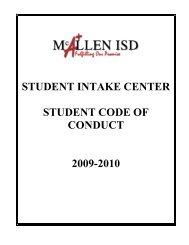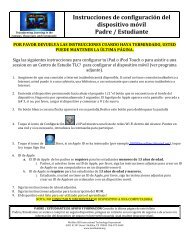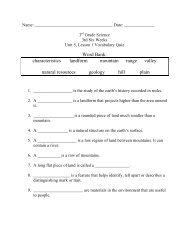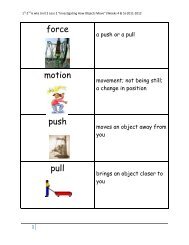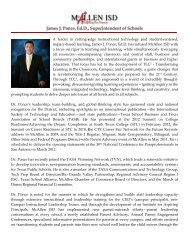2012-2013 High School Curriculum Bulletin - McAllen ISD
2012-2013 High School Curriculum Bulletin - McAllen ISD
2012-2013 High School Curriculum Bulletin - McAllen ISD
Create successful ePaper yourself
Turn your PDF publications into a flip-book with our unique Google optimized e-Paper software.
Page 222542 ADVANCED PLACEMENT (AP) CALCULUS BCLowest Grade Placement: 10Credit: 1Prerequisite: Calculus ABRank: APThis course is for students in a six-year math program and is intended toprepare students for taking the BC portion of the advanced placementtest. All Calculus AB topics will be extended. Additional topics includeanalysis and applications of planar curves; integration by parts, partialfractions, and improper integrals; infinite series as well as other topicsincluding differential equations, Slope Fields, Euler Method and Taylorseries approximations. This course is taught from an algebraic, numericand geometric approach. Students are required to take the AP ExamNOTE: This advanced course serves the identified gifted/talentedstudent.2555 INTERNATIONAL BACCALAUREATE (IB)Mathematics SLLowest Grade Placement: 11Credit: 1Rank: IBThis one-year course is designed to meet the Mathematics standard levelor the first year of the higher level requirement for the IB Diploma. Thiscourse provides students with a challenging curriculum that allowsstudents to become efficient problem solvers within the global aspectof mathematics. The emphasis of this course is the study of functionsand equations, trigonometry, vector geometry, statistics and probability,calculus, and analysis approximation. Students are required to spend10 hours completing a portfolio of work that includes mathematicalinvestigations, extended closed problem solving, and modeling. Thiscourse prepares students to take the Mathematics SL exam. Collegesand universities grant college credit based on scores earned on this exam.NOTE: This advanced course also serves the identified gifted/talentedstudent.2556 INTERNATIONAL BACCALAUREATE (IB)MATHEMATICS HLLowest Grade Placement: 12Credit: 1Prerequisite: IB Math Methods 2555Rank: IBThis one-year course is designed to meet the 2 nd year of the Mathematics<strong>High</strong>er level requirement for the IB Diploma. The emphasis in thiscourse is the study of functions and equations, trigonometry, vectorgeometry, matrices, statistics and probability, calculus, and analysis andapproximation. This course prepares students to take the Mathematics<strong>High</strong>er Level IB exam. College credit may be granted for scores onthis exam.NOTE: This advanced course serves the identified gifted/talentedstudent.2612 MATHEMATICAL MODELS WITHAPPLICATIONS CPLowest Grade Placement: 11Credit: 1Prerequisite: Algebra 1Recommendation: Credit in GeometryRank: CPFor freshmen entering 07-08, this course will satisfy math graduationrequirement, if taken prior to Algebra 2. This course allows students tocontinue to build on the K-8 and Algebra 1 foundations as they expandtheir understanding through other mathematical experiences. Studentsuse algebraic, graphical, and geometric reasoning to recognize patternsand structure, to model information, and to solve problems from variousdisciplines. Students use mathematical methods to model and solve reallifeapplied problems involving money, data, chance, patterns, music,design, and science. Students use mathematical models from algebra,geometry, probability, and statistics and connections among these tosolve problems from a wide variety of advanced applications in bothmathematical and non-mathematical situations. Students use a varietyof representations (concrete, numerical algorithmic, graphical), tools,and technology to link modeling techniques and purely mathematicalconcepts and to solve applied problems.2722 ADVANCED PLACEMENT (AP) STATISTICSLowest Grade Placement: 11Credit: 1Prerequisite: Algebra 2 or Pre-CalculusRank: APThis course is an option for students who have successfully completedthe Algebra II or Pre-Calculus course. The topics covered include use ofgraphical and numerical techniques to study patterns in data; formulatingdata collection plans; using probability as a tool for anticipatingdistribution of data; and use of inferential and diagnostic methods toselect appropriate models. Students are required to take the AP Exam.NOTE: This advanced course also serves the identified gifted/talentedstudent.2742 Advanced Quantitative ReasoningLowest Grade Placement: 11Credit: 1Prerequisite: Algebra IIRank: CPThis course is an engaging, relevant, and rigorous course that providesa strong background in statistics, as well as addressing interesting andimportant topics in finance, discrete math, trigonometry and other areasof mathematics. It uses what students have learned in algebra andgeometry to model and to solve a variety of problems. As studentsdo mathematics, they continually use problem-solving, language andcommunication, connections within and outside mathematics, andreasoning.2752 Independent Study/College Math PrepLowest Grade Placement: 11Credit: 1Prerequisite: Algebra IIRank: College PreparatoryThis course will serve as a College Readiness course where Seniorswill be given content above Algebra II needed to be successful inCollege Algebra at a University. Some of the math concepts that youwill be focusing on are: graphing and solving of functions (includingquadratics, linear, exponential, radical, and rational), solving of systemsusing matrices, simplifying exponents and radicals. At the same timestudents can place out of Developmental Math Course where no collegetranscript is awarded.4502 ADVANCED STUDIESLowest Grade Placement: 10Credit: 1Recommendation: NoneRank: NoneThis course is designed as an elective course where students conductin-depth research, prepare an approved product of professional qualityand present their findings to appropriate audiences. Students, workingindependently or in collaboration with a mentor, investigate a problem,issue, or concern; they research the topic using a variety of technologiesand present a product of professional quality to an appropriate audience.Students who are pursuing the Distinguished Achievement Program orthe International Baccalaureate diploma may take this course to earnstate credit for developing, researching and presenting their findings.NOTE: This advanced course also serves the identified gifted talentedstudent.SCIENCE3002 INTEGRATED PHYSICS AND CHEMISTRY ESLLowest Grade Placement: 9Credit: 1Prerequisite: Concurrent Enrollment in HILDor English I SOLPreferred: Currently Enrollment in Algebra 1Rank: StandardThis course provides a foundation of study for Chemistry and Physics.In the area of chemistry, students will investigate the relationshipsbetween the properties of matter and its components, as well as changesin matter and how fluid chemistry is a part of everyday life. In the areaof physics, the study of force, motion, waves, energy transformationand their application to everyday life are emphasized. Laboratoryinvestigations are both independent and group-oriented. Studentswill formulate hypotheses, conduct experiments and make informeddecisions. Mathematics, problem solving, critical thinking, oral andwritten communication and research techniques are emphasized. NOTE:IPC is an entry level applied science course for students who have notreceived instruction in Physics or Chemistry. This course does not meetthe science requirement under the DAP Program.3012 INTEGRATED PHYSICS AND CHEMISTRY SDLowest Grade Placement: 10Credit: 1Prerequisite: NoneRank: StandardThis course provides a foundation of study for Chemistry and Physics.In the area of chemistry, students will investigate the relationshipsbetween the properties of matter and its components, as well as changesin matter and how fluid chemistry is a part of everyday life. In the areaof physics, the study of force, motion, waves, energy transformationand their application to everyday life are emphasized. Laboratoryinvestigations are both independent and group oriented. Studentswill formulate hypotheses, conduct experiments and make informeddecisions. Mathematics, problem solving, critical thinking, oral andwritten communication and research techniques are emphasized. NOTE:IPC is an entry level applied science course for students who have notreceived instruction in Physics or Chemistry. This course does not meetthe science requirement under the DAP Program.3022 INTEGRATED PHYSICS AND CHEMISTRY CPLowest Grade Placement: 10Credit: 1Prerequisite: NoneRank: College PreparatoryThis course provides a foundation of study for Chemistry and Physics.In the area of chemistry, students will investigate the relationshipsbetween the properties of matter and its components, as well as changesin matter and how fluid chemistry is a part of everyday life. In the areaof physics, the study of force, motion, waves, energy transformationand their application to everyday life are emphasized. Laboratoryinvestigations are both independent and group-oriented. Studentswill formulate hypotheses, conduct experiments and make informeddecisions. Mathematics, problem solving, critical thinking, oral andwritten communication and research techniques are emphasized.NOTE: IPC is an entry level applied science course for students whohave not received instruction in Physics or Chemistry. This course doesnot meet the science requirement under the DAP Program.3102 BIOLOGY ESLLowest Grade Placement: 9Credit: 1Prerequisite: Concurrent Enrollment in HILD or English 1 SOLRank: StandardStudents will conduct descriptive, comparative and experimentalinvestigations 40% of the time. Students will make informed decisionsusing critical thinking and scientific problem solving. Students in thiscourse study a variety of topics that include: structures and functions ofcells and viruses; growth and development of organisms; cells, tissues,and organs; nucleic acids and genetics; biological evolution; taxonomy;metabolism and energy transfers in living organisms; living systems;homeostasis; ecosystems; and plants and the environment. This courseis taught using ESL strategies.3112 BIOLOGY SDLowest Grade Placement: 9Credit: 1Rank: StandardStudents will conduct descriptive, comparative and experimentalinvestigations 40% of the time. Students will make informed decisionsusing critical thinking and scientific problem solving. Students in thiscourse study a variety of topics that include: structures and functions ofcells and viruses; growth and development of organisms; cells, tissues,and organs; nucleic acids and genetics; biological evolution; taxonomy;metabolism and energy transfers in living organisms; living systems;homeostasis; ecosystems; and plants and the environment.



